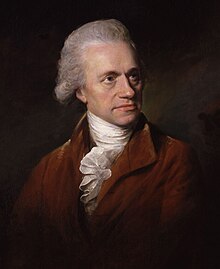How Americans Took Sides over Georgium Sidus
The Age of Revolutions just published M. A. Davis’s article “American Uranus: The Early Republic and the Seventh Planet.”
Like my political snakes article on the same site, this starts with eighteenth-century science and moves into the political implications of that new understanding.
In the middle of the war over American independence, the astronomer William Herschel (shown here) extended the reach of Britain in a new way: he discovered a planet beyond Saturn.
All previous planets had been known since antiquity, so this was a very big deal. Herschel himself had reported this object as a comet, just a very big one in a near-circular orbit far from Earth.
“You will find I hope that we have not been idle,” wrote Royal Society president Joseph Banks, sending the news to a member busy negotiating the Treaty of Paris: Benjamin Franklin. For those men, scientific discovery transcended new national borders.
Thomas Jefferson also admired Herschel, noting “the number of double stars” he had discovered. But he didn’t like the name that Herschel gave to that new planet, telling the Rev. Dr. Ezra Stiles that the British “foolishly call it Georgium sidus,” after King George III.
At that time Jefferson was calling that planet “Herschel,” after its discoverer. Not surprisingly, that suggestion had come from a French astronomer, Jérôme Lalande. No matter that Herschel himself had chosen the name Georgium sidus [George’s star], after his patron, who granted him £200 per year.
There were still other names proposed. The Swedish astronomer Erik Prosperin suggested “Neptune,” which some colleagues connected to the strength of Britain’s Royal Navy. Davis’s article reports that in 1791 the Jeffersonian National Gazette of the U.S. used “Cybele.” That was the mother goddess of ancient Phrygia. Anything to avoid honoring King George.
Davis writes:
Back in 1781, the German astronomer Johann Elert Bode had responded to William Herschel’s announcement by going back into older star charts and finding the planet catalogued there, mistaken for a star. By stringing those sightings together, Bode calculated its slow orbit. He also proposed a name for that planet. Since the mythological Saturn was Jupiter’s father, Bode apparently reasoned, the next planet out should be Saturn’s father.
Now technically the Latin name for Saturn’s father was “Caelus.” That god’s standard Greek name was “Ouranos.” But Bode used Uranus, and that’s the name Americans came around to. Even Britain’s National Almanac Office adopted Uranus in 1850.
Like my political snakes article on the same site, this starts with eighteenth-century science and moves into the political implications of that new understanding.
In the middle of the war over American independence, the astronomer William Herschel (shown here) extended the reach of Britain in a new way: he discovered a planet beyond Saturn.
All previous planets had been known since antiquity, so this was a very big deal. Herschel himself had reported this object as a comet, just a very big one in a near-circular orbit far from Earth.
“You will find I hope that we have not been idle,” wrote Royal Society president Joseph Banks, sending the news to a member busy negotiating the Treaty of Paris: Benjamin Franklin. For those men, scientific discovery transcended new national borders.
Thomas Jefferson also admired Herschel, noting “the number of double stars” he had discovered. But he didn’t like the name that Herschel gave to that new planet, telling the Rev. Dr. Ezra Stiles that the British “foolishly call it Georgium sidus,” after King George III.
At that time Jefferson was calling that planet “Herschel,” after its discoverer. Not surprisingly, that suggestion had come from a French astronomer, Jérôme Lalande. No matter that Herschel himself had chosen the name Georgium sidus [George’s star], after his patron, who granted him £200 per year.
There were still other names proposed. The Swedish astronomer Erik Prosperin suggested “Neptune,” which some colleagues connected to the strength of Britain’s Royal Navy. Davis’s article reports that in 1791 the Jeffersonian National Gazette of the U.S. used “Cybele.” That was the mother goddess of ancient Phrygia. Anything to avoid honoring King George.
Davis writes:
Not every American hesitated to use the British term for the new planet, even in the Early Republic. In 1795, the Gazette of the United States and Daily Evening Advertiser, an vigorously Federalist paper from Philadelphia, mentions the “‘tenth muse,’ lately arrived from ‘Georgium Sidus.’”Of course, 1811 wasn’t a good time for U.S.-British relations. American writers continued to call the planet “Herschel” most of the time through the 1840s. Only then did a dark horse candidate gain favor.
Given the Anglophilia of the Federalist press, perhaps this is not surprising – but the divide over the new planet was not quite that simply partisan. On April 20, 1801, DC’s National Intelligencer and Washington Advertiser had no problem referring to (in Herschel’s obituary) his role as “discoverer of the new planet Georgium sidus.” And the National Intelligencer, in an age of partisan divides in the press, was an enthusiastically Republican paper and one closely affiliated with Jefferson! Jefferson’s preferred “Planet Herschel” appeared next in the Alexandria Gazette, Commercial & Political in 1811 – a Federalist paper.
Back in 1781, the German astronomer Johann Elert Bode had responded to William Herschel’s announcement by going back into older star charts and finding the planet catalogued there, mistaken for a star. By stringing those sightings together, Bode calculated its slow orbit. He also proposed a name for that planet. Since the mythological Saturn was Jupiter’s father, Bode apparently reasoned, the next planet out should be Saturn’s father.
Now technically the Latin name for Saturn’s father was “Caelus.” That god’s standard Greek name was “Ouranos.” But Bode used Uranus, and that’s the name Americans came around to. Even Britain’s National Almanac Office adopted Uranus in 1850.


No comments:
Post a Comment